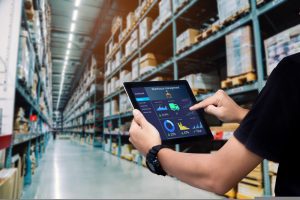-
30
Sep
Many people are already starting to countdown to Christmas. Certainly, Christmas planning is well underway in the logistics business. But Christmas isn’t the countdown that everyone is talking about in our industry at the moment… it is the countdown to the end of the Brexit transition on 31st December 2020 that is making everyone nervous.
 As of today, that is 98 days away, and the reason that many hauliers are apprehensive is that the government’s introduction of the new digital freight management system ‘Smart Freight’ looks like it is not going to happen in time.
As of today, that is 98 days away, and the reason that many hauliers are apprehensive is that the government’s introduction of the new digital freight management system ‘Smart Freight’ looks like it is not going to happen in time.Here at Masters, most of our work is on the UK mainland, so we are fortunate that it doesn’t affect us directly, but it is something that many of our readers may want to be briefed on.
What is the Smart Freight System?
The Smart Freight System is a digital service that helps to ensure that trucks are carrying the correct documentation before they travel to ports. It is being designed to ensure that cross border supply chains can continue to function smoothly post Brexit. (ie after 31st December 2020).
Smart Freight is a web-based application that provides lorry drivers with an online portal where they can check if their paperwork is correct, in order for them to enter the EU.
It works by preventing vehicles that are NOT ‘border ready’ from entering the ports, or indeed the road network around Kent, and thus enabling the traffic to keep moving.
It is one of four digital system the government control to manage freight at the border, three of the systems are going ‘ok’, but there are fears that Smart Freight is not going to be ready in time.
So, what is the current situation?
The Government says that the Smart Freight System will be ready. They say it is being rolled out from December in ‘beta’ format. Whilst many interpret ‘beta’ as being in a ‘testing’ phase, the Government have attempted to reassure logistics operators by stressing that it will in fact be fully operational.
They finished version is due to go live in April 2021 – several months after the end of the Brexit transition period.
What is the industry saying?
“Will the UK be ready for the end of transition? ‘Not a chance,’
says RHA’s Richard Burnett. Continuing, Mr Burnett said: “Mr Gove stresses that it’s essential that traders act now to get ready for new the formalities. We know for a fact that they are only too keen to be ready but how on earth can they prepare when there is still no clarity as to what they need to do?”
Mr Burnett’s frustration was heartfelt in that he believes delays are inevitable and that Mr Gove was passing blame onto the operators, when in fact, the problem lay with the lack of solutions available to them.
The response from Elizabeth de Jong, Policy Director of Logistics UK (the new name for FTA) offered a similar warning
“Logistics UK has long warned government of the potential for border delays after the UK leaves the EU, and while there is still time to put mitigations in place to avoid them, it will be a huge challenge for government and industry to achieve.”
Elizabeth de Jong continued by reiterating the importance of Freight operators having time for training and testing of the new systems and how full working guidance of the port systems to be used in Europe must be provided.
Conclusion
It’s been a challenging year for so many people, the logistics sector are no exception. Having valiantly kept the country moving throughout the initial hard lock-down and continuing through the pandemic, now having to manage the end of the Brexit transition period and enter the realms of the ‘unknown’ at the borders, whilst in the midst of seasonal Christmas planning period, there is certainly a lot of midnight oil being burnt by logistics bosses throughout the UK.
To discuss your logistical requirements, please call Mervyn Jeffery today on 01353 648222.